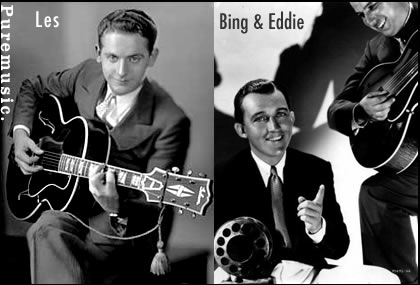
A Conversation with Les Paul
Puremusic: Who was your first guitar hero?
Les Paul: Eddie Lang. I heard him noodling behind Bing Crosby on an early radio broadcast. I realized that there was someone out there who was very advanced. So I bummed a ride in a Model T Ford and got from Waukesha to Milwaukee and went to the music store and ordered some recordings of Eddie's. When I got them, I realized how little I knew. The other one was Segovia. Between those two, I had plenty of work to do (laughs).
PM: What was your first guitar?
LP: A little Sears & Roebuck acoustic that cost $2.98. I used that, then progressed to a better instrument, a dobro. The dobro went out the window and I got myself an L-5. So in a very short period of time, I went from the Sears & Roebuck to the Gibson L-5, the best guitar they made at that time.
PM: Do you recall the first song you learned to play?
LP: "Darktown Strutter's Ball."
PM: Did you do a lot of dissecting of other guitarists' solos?
LP: I'd play the record over and over, but it wasn't like it is today, where a person has so many resources for learning--books, DVDs, and so on. I couldn't even get a guitar pick in my hometown. So I'd take the last key off the piano. They always knew where I'd played last, because the keys were missing. [laughs]
PM: The first time you heard a Django Reinhardt record was a turning point for you.
LP: It was surely a step in the right direction. I admired him a lot, and learned that he also was an admirer of Eddie Lang. He learned from the very same records. We were going different directions, but there were similarities.
In 1944, Django came to the Paramount Theater, where I was playing, and the doorman yelled up--I was on the sixth floor--and he said, "There's a fella named Django Reinhardt that would like to come up to your room. Should I send him up?" I said, "Send him up with a case of beer and Jesus Christ and I'll give 'em both an autographed picture." I didn't believe him! In walks Django, and that was the first time we met. He had an interpreter with him. We sat down and we jammed.
Django watched us play that night, and he said, "I want to play electric guitar like you." And he never switched back. He was a wonderful person. We got to be great friends.
PM: When you were playing in Chicago in the '30s, did you have any run-ins with mobsters?
LP: There sure were a lot of mobsters in the city. [laughs] It was an interesting time. When I went there, I ended up playing for Ralph Capone in his club, the Colosimo. Knowing a lot of the mobsters, when I put a day's work in--let's say I'm working in a radio station--I couldn't wait to get home and hear the news because it was like a soap opera. You knew that Capone just wiped out the South Side. Baby Face Nelson was in a cornfield between Milwaukee and Chicago. And Dillinger was floating around on the north side. We grew up with it. It was always exciting and interesting. continue
print (pdf) listen to clips puremusic home